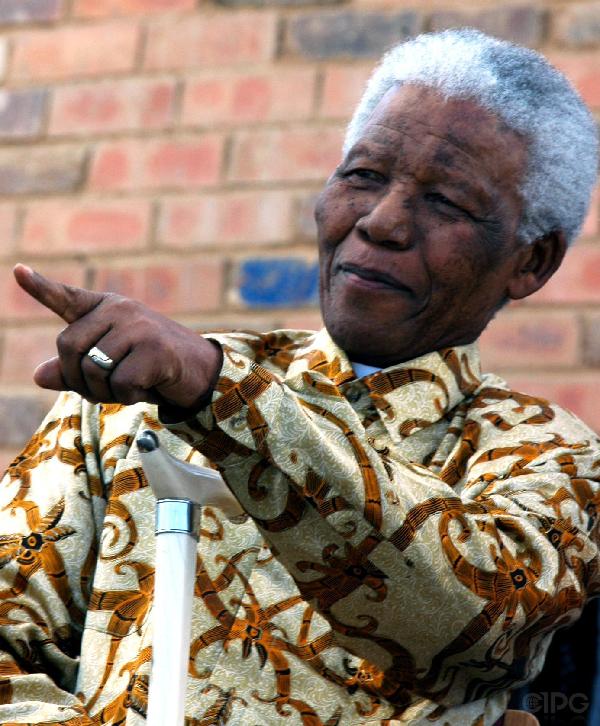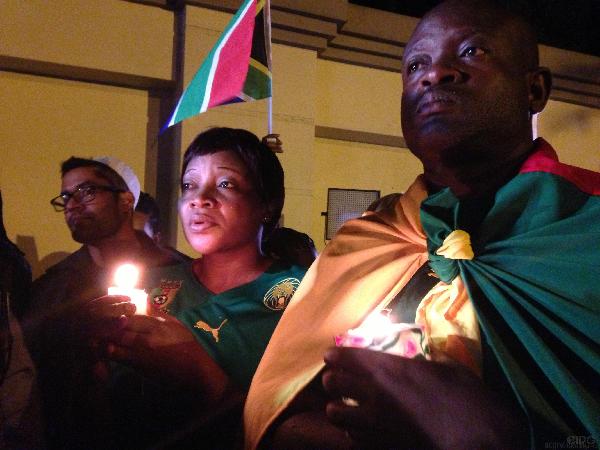| 
Bring back Nelson Mandela, bring him back home to Soweto, we want to see him walking down the streets of South Africa … tomorrow ... bring back Nelson Mandela ...
These are excerpts of a song that was etched in the minds of young people growing up in the late 1980s and early 1990s. From the parched wastelands of Mauritania to the rich minefields of Zaire, and from the mouth of the great Nile, meandering through Sudan, past the savanna of Kenya and Tanzania to Mozambique, the words of the song resonated with the unflinching admiration Africans had for the man held prisoner on Robben Island - the man who held the continent's hope that South Africa's oppressive apartheid would be crushed.
This song was from the 1988 musical film, Sarafina, a re-enactment of the Soweto Riots, engineered by high school students on the morning of June 16, 1976. The teens rose to oppose policies that sought to wipe out their culture and confine them to the bins of social-cultural inferiority.
African message
Hundreds were killed but their courage sent a message to Africa and the world. In the film, the will to withstand bullets and humiliation is summed up by the lead actress Leleti Khumalo. She wakes up at dawn, stares at a picture of Nelson Mandela on the wall and simply says, "Good morning Nelson," in the same manner one might address the gods or saints for intercession.
Sarafina, through music, brought Mandela into the living rooms and minds of young Africans outside South Africa, who were perhaps ignorant, too young and unaware, or had not yet grasped the gravity of apartheid. With it came the name, the face and fist in the air: Mandela - fondly known by all in Africa as Tata Madiba (Father Madiba).
To adults across Africa though, Madiba was in their thoughts as they went about their lives. In Kenya and across East Africa, men donned the Mandela hairstyle, the stylish parting of hair at the front. They named their children after him, and when one wanted to brag about his strong will and courage over a calabash of village beer, he simply shouted, "I am a Nelson." Dating teens in township alleys and grazing fields could be heard dropping lines, "I am a Nelson; could you be my Winnie?" (Winnie is the name of Mandela's second wife).
The post-independent Africa hobbled from one misstep to another. The chinks and honks of independence were fading away as country after country hit its cul-de-sac with political and economic instability. Looking to Mandela's release provided Africans outside South Africa with a great distraction, a fresh ray of hope just like the night before independence.
Face of the struggle
As the 1990s dragged on, if a foreigner asked you that nerve-wrecking question, "What is wrong with African leaders?" one could easily quip, "Well, at least we have Mandela and Mwalimu Julius Nyerere." This is the same Mandela of whom the then South African Prime Minister said in 1975, "Anyone who wants to talk to me on the basis that Mandela is the leader of black South Africa can forget it."
No amount of brutality could silence Mandela's loud statement across Africa, a quest for freedom from racial bigotry and liberty from the suffocating ills of colonization and neo-colonization. His struggle became one with the struggle of millions of Africans oppressed by a festering legacy of slavery and colonialism.
Mandela's plight galvanized Africans across the globe. In his book, Dreams of My Father, President Barack Obama says it is in Mandela's incarceration and the immorality of Apartheid South Africa that he found the motivation for his first public oration while in university.
Africans across the continent who grew up during Mandela's detention were inspired by his courage; he became the symbol of the pains of South African blacks and the indifference with which the world handled African issues. Mandela's detention was a springboard for a strong sense of Black Power among African nations and leaders.
As far north as Tanzania and the Maghreb, the malevolence visited on Mandela and his comrades drove the countries to support Mandela's cause, offering asylum to South African fugitives and arms and support for fighters.

South Africans light candles outside the Johannesburg home of South Africa's former President Nelson Mandela on December 6, who passed away at the age of 95 after a prolonged lung infection
Art of forgiveness
His release from prison and ascendancy to president of South Africa offered the whole continent an immense sense of triumph and victory. Someone who had gone into jail angry and spoiling for war came out after 27 years with a Lincolnian touch: "With malice toward none, with charity for all."
He learned that succumbing to vengeful passions brought fleeting joys at the cost of lasting benefits. It is with this Solomonic that as president of South Africa, he sought to end relentless wars, bloodletting and conflict in the Great Lakes Region. Rwanda, DR Congo, Ivory Coast and the then Sudan.
He embraced his jailers, and dined with the iron-fisted apartheid leader P. W. Botha, providing a lesson in virtue for warring African leaders.
Ultimately he left power, which he had almost died for, to others. He walked off the stage with honor and dignity. His magnanimity shook the corners of Africa. It turned the knife in the hearts of those leaders who cling to power for life, while setting aside and oppressing opponents. He set the bar high for the rest of Africa.
Yet even as he will tower over his contemporaries like a colossus, it is in what he thought of himself that we find a winner with humbling humility, "I don't think there is much history can say about me. I just want to be remembered as part of that collective."
Beyond South Africa, Mandela was created for Africa. Whence cometh another?
(The author is a Media Editor and Lecturer in International Affairs at Kenya's Moi University)
|